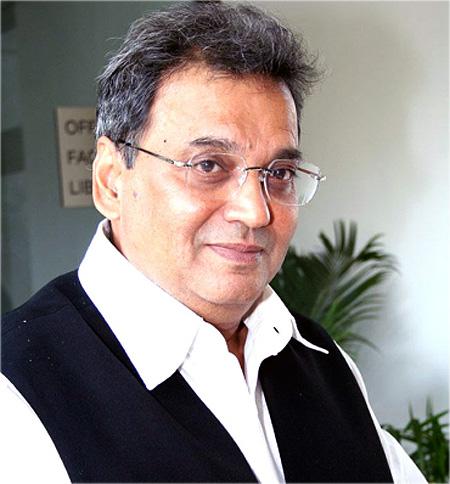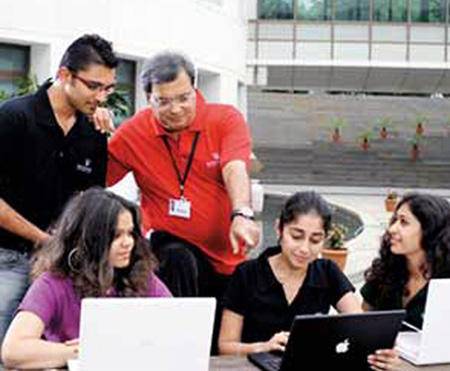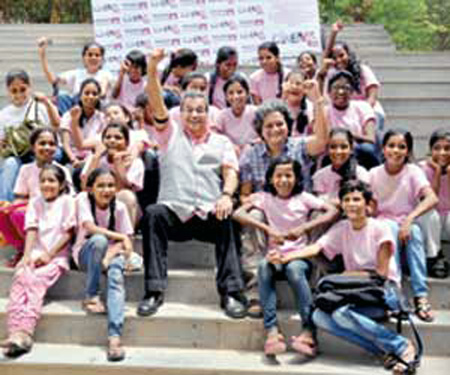 | « Back to article | Print this article |
Subhash Ghai's advice to aspiring filmmakers
Veteran Bollywood filmmaker Subhash Ghai has worked in films for over 40 years.
He joined the industry after a diploma from the Film and Television Institute of India (FTII), Pune, and won Filmfare awards for Best Director for Saudagar in 1992, Best Screenplay for Pardes in 1998 and the National Film Award for Best Film on Other Social Issues for Iqbal in 2006.
In this interview the director shares his filmmaking journey and foray into film education through Whistling Woods International. Read on..
What qualities does one need to become a good filmmaker?
A filmmaker's job is endless, from raising the capital for the film to distribution to overseeing the acting, directing, script writing, editing, sound recording, visual mixing, and cinematography. So, one must possess artistic and technical skills and at the same time, have the ability to express ideas.
Creativity, desire, motivation, focus, sensitivity, self-discipline, patience and determination are a few of the necessary qualities one must have to become involved in the art of filmmaking. In addition, one must compulsorily be a unique storyteller.
How did you get your break as a director?
My move to direction was by luck or fate. While I struggled to make it as an actor, opportunities to write came my way and I decided to take those up.
One day when I narrated a script to NN Sippy, a big producer of those times, he liked my narration so much that he offered me my first directorial venture. I was shocked!
It was an opportunity of a lifetime and I took it up with Kalicharan, which went on to be a super hit.
A memorable incident from your sets...
When making Saudagar, I was warned not to make a film with Dilip Kumar and Raaj Kumar together; it was said they didn't get along.
During our first schedule in Kulu-Manali, Raajji watched Dilip saab shooting from a distance and heard him speak in colloquial language.
He called me and said, "Ghai I'll not do this film. You didn't tell me that he'd be speaking a regional language. He will take the cake! Either I also speak the same or not do the film".
I reasoned that Dilip saab's character had been born and brought up in the village, whereas Raajji's was supposed to have returned from Harvard University, so his language had to be polished.
I explained to him that it was not about Raaj Kumar versus Dilip Kumar; it was about the characters Rajeshwar Singh and Veer Singh.
I left him a note, which read, 'I hope you understand the dilemma of a writer and director. Let him be true to his film.'
At 10 am, the next morning Raajji was present on the set!
Please click NEXT to continue reading...
'The FTII was like a second home to me'
How important was formal education for your career?
Filmmaking is a craft that one has to constantly work at. Formal education and training are absolutely crucial for any newcomer to the industry.
One thing that really helped me hone my skills was the strong foundation that education and technical training gave me.
The FTII was like a second home to me. I learnt a lot of my craft from my teachers there.
How has the audio-visual sector grown over the last few decades?
There has been immense growth in the audio-visual sector, for sure. However, film education is still a very, very niche area in India.
There are very few institutes in this space currently but this is an area that is poised to grow over the next few years.
What are your observations on the state of film education?
Educators in this sector must be very careful, that they are imparting quality education to their students. Short, part-time courses sometimes produce half-baked professionals which is even more dangerous for the industry.
I think India needs at least a 100 cinema schools so that we can nurture creative talent and remove mediocrity, however, you can't fit too many students into each batch.
Whistling Woods International offers a highly practical 'filmmaking' course, not only a 'film studies' course.
In the 3200 hours of contact time, a student learns film theory, history and appreciation but is also part of six film projects during his two years.
'We have over 800 alumni working in the industry'
How was WWI formed? And how has it evolved over the years?
There were many studios earlier, but there were no schools/institutes that could provide professional training or make a platform for strugglers.
In 1992, I had a dream to set up an institution that would train students in filmmaking; the kind of school that would create the next generation of filmmakers and media professionals in India.
When my daughter (Meghna-Ghai Puri) and I set up Whistling Woods International (WWI), after extensive research and drawing from experiences of some of the finest film schools of the world, we worked on evolving a new educational model that ensured our students had a firm footing and good traction with the media and entertainment industry.
With WWI by the time the students graduate, they are trained professionals and have already formed strong bonds within the industry. We have over 800 alumni working in the industry.
What if you cannot afford the fees but are talented?
It's a common misconception that only kids who can afford it, study at Whistling Woods. We offer scholarships to students, with good value for their money. Eighty-five percent of the students that come here on loans have a job in hand before graduating.
How did you handle failure?
I've been asked why movies like Kisna and Yuvraaj failed to impress audiences. Well, when you are at the zenith, you have a desire to move away from the run-of-the-mill fare and make a classic. I admit that's a risk.
These films were not with the times, and didn't match the sensibilities of the youth. But I don't regret that I made these movies.
Any advice to aspiring filmmakers from non-filmy backgrounds...
The film industry is highly competitive but it also has a lot of scope for employment opportunities too.
In a country like India which releases a large number of films every year, there is always room for new voices.


